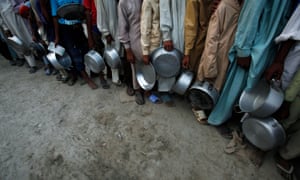Do international NGOs still have the right to exist?
After 60 years of development it’s time for INGOs to ask some difficult questions about what power they need to devolve
 |
| Flood victims holding their plates stand in queue for food handouts in Pakistan. Photograph: Akhtar Soomro/Reuters |
The Guardian | 13 March 2016
It’s
highly unlikely that corporate bosses regularly ask themselves if their
businesses have a right to exist. Their goal is to sell stuff and make a
profit. But if your goal is to alleviate poverty and human suffering –
in the face of statistics showing mixed outcomes – is this, in fact, the
most important question an International NGO can ask of themselves?
At the BOND conference
last week, in a session entitled How can INGOs survive the future,
Penny Lawrence, the deputy CEO of Oxfam stated bluntly: “we need to earn
the right to survive the future.” It is like the sector’s very own
Damascene moment.
Plagued with concerns about accountability and effectiveness,
alongside an NGO backlash both at home and abroad, there is clearly
something afoot. Oxfam International is shifting its headquarters to
Nairobi. ActionAid moved to Johannesburg long before, while Amnesty
International is decentralising at a rapid pace too. But aside from a
shuffling of senior staff and some programme staff, none that I’m aware
of – with the outstanding exception of Everychild (an INGO dealing with children’s rights) – has gone so far as to ask the question “do we have a right to exist?”
Prof Robert Chambers in his book, Development: Whose Reality Counts?
Putting the First Last, reflects on the view that listening [even then!] and
participation isn’t enough: the whole idea of empowerment means
development institutions need to disempower themselves too. The book is
about the urban/rural and north/south bias, but his overall thesis
resonates far more widely: much of the challenge of development, he
argues, is to give up power. It could be argued that over the past two
decades, many have done little more than pay lip service to the
sentiment.
Power, ironically, is what may be holding INGOs back from achieving
impact. Ben Ramalingam, from the Institute of Development Studies said
that this has led to a sort of Faustian bargain: with money and access
to the corridors of places from Westminster to the World Trade
Organisation, INGOs have failed to take risks and instead simply
pacified everyone at the expense of seeking real change. Beris Gwynne,
the former director of World Vision International agreed: “We’ve become
used to being in business, so we’ve become less and less courageous.”
Devolving power, or earning the right to exist will demand
confronting some challenging paradoxes: INGOs know they need to take
more risks, but donors demand control. They know we need to collaborate
more, but with that comes endless talk shops and more layers of
complexity … and possibly more reports. They know we need to be enablers
and listeners, but INGOs still have the budgets and the power to decide
what to do with what they’ve heard.
Perhaps a practical way forward is to confront the real
question: what’s the value added of INGOs and what do they need to
devolve to others, and to let go of? As one participant remarked: would
the poor pay for your services? While marketisation in this way probably
takes things too far, it’s a provocative question. Would a poor farmer
think its valuable for me to write and present a paper at a high level
UN panel, on the causes of her impoverishment, or would it be better to
simply give her the cheque (more income than she might see in years) and
let her do what she wants with it? Which action will make her less
poor, both now and in the future? After 60 plus years of development in
practice, it’s hard to say.
INGOs are, thankfully, starting to confront these home truths. If, in
answering the difficult questions, they don’t find strong enough
answers from beyond the hallowed halls of Oxford, London, New York or
Geneva (ie the South) to justify their ongoing existence, then letting
go in part or in whole seems the logical and most just next step to
take.


No comments:
Post a Comment